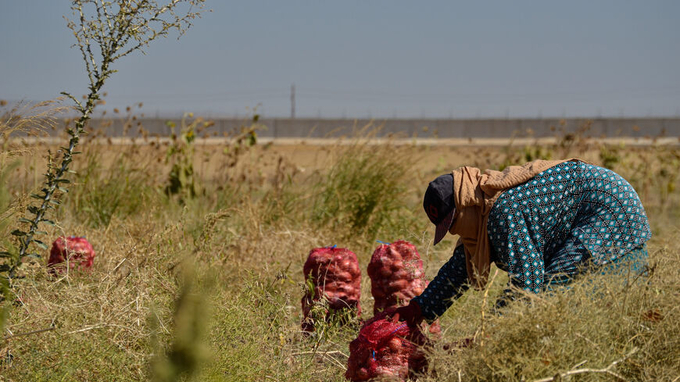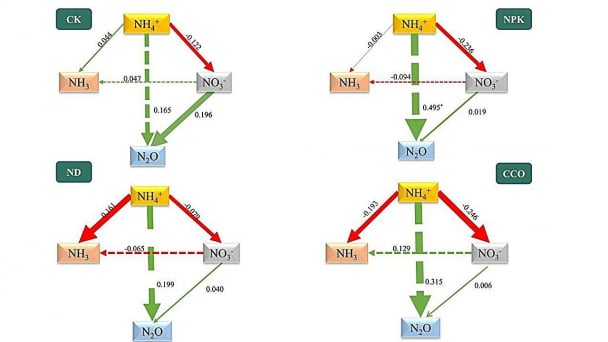June 25, 2025 | 00:28 GMT +7
June 25, 2025 | 00:28 GMT +7
Hotline: 0913.378.918
June 25, 2025 | 00:28 GMT +7
Hotline: 0913.378.918

A daily worker harvests onions in Darbasiyah sub-district, Sept. 29, 2022
It’s a hot, windless September day in Darbasiyah, a sub-district of Syria’s al-Hasakah province. Under a scorching sun, a dozen agricultural workers – most of them children – pull out onions from the powdery soil. Behind their backs is a gray concrete wall topped by ominous watchtowers.
This is “Erdogan’s wall,” nicknamed after Turkish President Recep Tayyip Erdogan, who started building it in 2015, allegedly to secure the Syrian-Turkish border and limit new refugee arrivals to Turkey. Crowned by razor wire, the three-meter-high wall has become a defining feature of northern Syria’s landscape, running along nearly 800 kilometers of the border.
But the wall, completed in 2018, is more than a gloomy feature in an otherwise gentle rural landscape.
In an area where most people depend on agriculture, this militarized border has become a source of rising stress and economic hardship. Over the summer, tension between Turkey and the Kurdish-led authorities of northeastern Syria has brought life under the wall to a standstill. Threatened by sporadic bombings, drone strikes and even direct gunfire from Turkish border guards, Syrians nearby live in increasing fear of losing their crop, land, or life.
Showered by shells
“Last month, heavy shelling fell around our village, probably targeting a nearby military point,” Salma*, a resident of Darbasiyah, told Al-Monitor. As residents fled in a panic, a shell fell on the border hamlet in northeast Syria. No one was injured, but no one can forget. “To this day, we don’t sleep well at night,” Salma added. “Our bags are always ready in case we need to leave.”
Decades before Erdogan’s wall was erected, the border was already fenced and patrolled by armed guards, and heavily mined by Turkey to prevent smuggling.
But relations with Syrian farmers were cordial, residents of Darbasiyah recalled. “Soldiers on the other side of the fence would talk to us when we worked in the fields, ask us to send the kids to bring them cigarettes, food and water,” Um Azab recalled. When the wall was built, these relations broke off. Syrians no longer exchange cigarettes with the border guards; instead, they started to receive showers of ammunition.
In recent months, Turkey has been waging an intense military campaign from the sky, repeatedly shelling rural areas along the Syrian side of the border and executing officials of the Autonomous Administration of North and East Syria (AANES), the de facto government, through targeted drone strikes. Between January and October, Turkish drone strikes killed at least 66 people in northeastern Syria, including 23 civilians, according to a local media center based in northeast Syria Rojava Information Center (RIC). This count excludes many more killed by Turkish shelling. In the first five days of October alone, shelling targeted more than fifteen different villages in the Syrian countryside, injuring several civilians, according to RIC.
Turkey’s undeclared war targets the AANES, a coalition of various Arab, Kurdish and Syriac political parties. The coalition was initiated and remains heavily influenced by the Democratic Union Party (PYD), a Kurdish party advocating for greater autonomy. Ankara views the PYD as an extension of the Kurdistan’s Worker Party (PKK) — a guerrilla group seeking independence for Turkey’s own Kurdish minority. The PKK has long been designated a terrorist group in Turkey, and Ankara frequently carries out drone strikes in neighboring Iraq and Syria against its leadership. Since 2018, Turkey has also breached the Syrian border several times to launch military operations, taking over vast swaths of its territory. Tensions reached new highs in May as Erdogan vowed to launch a new military offensive in northern Syria.
Farming under fire
The feared land offensive has yet to materialize, but Syrians living along the border are directly affected by mounting tensions.
The strip of land running east-west from the region of Derik, at the border with Iraq, all the way to the Mediterranean Sea, is considered prime agricultural land due to higher rainfall levels and the quality of soil and underground water. But farming has become increasingly difficult.
“We used to go water our fields at night,” Um Azab said. “But we no longer dare to get close to the wall after dark, or even to walk in the countryside outside the village. When the Turkish soldiers spot us, they shoot in the air, warning us to go back home.”
Those whose land runs all the way to the wall avoid spending time there as much as possible. “Most vegetables require daily watering. So, on land closest to the wall, I planted wheat, because it is rain-fed and I don’t need to go there every day,” Abu Mohammad, a 43-years old farmer from Darbasiyah, said. For similar reasons, others stopped bringing their cattle to graze at the foot of the wall.
Daily laborers hired to help with the harvest are also directly exposed to the rising tensions. “A few weeks ago, we woke up to the sound of bombing,” an agricultural laborer harvesting onion fields east of Darbasiyah told Al-Monitor. “For three nights it went on, and for one week we did not set foot in the fields. We were terrified of coming out.”
There was little protection from the dry mud houses of the nearby village, which had already been deserted by its original inhabitants. But the workers had come from the city of Hasakah for the harvest. Leaving the area meant losing their income, and they had nowhere else to go.
Lingering crises
Sour relations with Turkey don’t help Syrian farmers, who are already grappling with a host of issues, from the lack of water to the high cost of fuel and fertilizer.
For the past two years, Syria has faced a historic drought and several consecutive failed harvests. This lack of rainfall is compounded by political tensions with Turkey, which built dozens of large dams to increase its own irrigation capacity, slashing the flow of water to downstream Syria and Iraq.
Along the border, satellite imagery reveals stark contrast between Turkey’s lush, irrigated fields and dried-up Syrian land a few kilometers south. Here again, farmers are paying the price of border tensions: less water for irrigation, and reduced access to wells and springs located near the wall.
“The provision of municipal services along the border is of course affected by the political situation,” Sleman Arab, the co-chair of the AANES’ Department of Municipalities in the Jazira region, told Al-Monitor. “Essential facilities like water stations, or generators that powered water pumps for wells … have been directly and intentionally targeted.”
“There are dozens of villages that don’t have clean water because their water pumping facilities have been destroyed. Some electrical power stations have also been targeted,” Arab said. In addition, many water and sanitation projects could not be completed "due to their geographic location and border tensions, and workers on these projects being targeted by Turkey.”
Worried about a possible military offensive, many residents are reluctant to invest time and money in their fields. According to Abu Mohammad, most farmers have stopped storing seeds from their harvest for the next planting season. “They prefer to sell everything they have and buy new seeds the following year. The future is too uncertain.”
Um Azab recalled the traumatizing night when shells fell over her village, hitting two houses. “For weeks after this, all families moved to their relatives’ houses in other areas,” she said. “The men would return during the day to check on the houses and fields, but no one would spend the night.”
“We stopped loving our village,” Um Azab concluded. “Living here has become too dangerous.”
(Monitor)

(VAN) Researchers from the Institute of Applied Ecology of the Chinese Academy of Sciences have developed a new environmentally friendly fertilizer additive that significantly enhances crop yields while reducing emissions of harmful gases.

(VAN) Poultry production in Poland, which has only started recovering from devastating bird flu outbreaks earlier this year, has been hit by a series of outbreaks of Newcastle disease, with the veterinary situation deteriorating rapidly.

(VAN) Extensive licensing requirements raise concerns about intellectual property theft.

(VAN) As of Friday, a salmonella outbreak linked to a California egg producer had sickened at least 79 people. Of the infected people, 21 hospitalizations were reported, U.S. health officials said.

(VAN) With the war ongoing, many Ukrainian farmers and rural farming families face limited access to their land due to mines and lack the financial resources to purchase needed agricultural inputs.

(VAN) Vikas Rambal has quietly built a $5 billion business empire in manufacturing, property and solar, and catapulted onto the Rich List.

(VAN) Available cropland now at less than five percent, according to latest geospatial assessment from FAO and UNOSAT.